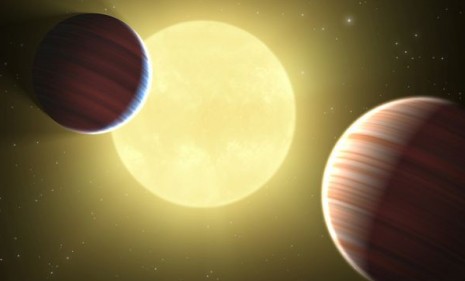2010's top mysteries of space
Astronomers and scientists have been busy this year discovering planets, creating black holes, and finding new threats to life on Earth

A free daily email with the biggest news stories of the day – and the best features from TheWeek.com
You are now subscribed
Your newsletter sign-up was successful
For space enthusiasts, the year began with more of a whimper than a bang when President Barack Obama opted to kill NASA's Constellation program in February, but there was still plenty of interstellar intrigue. From new worlds and planet-destroying asteroids to sun storms and Big Bang machines, here are some of the year's key discoveries and controversies, in reverse chronological order:
December
NASA finished the year under a cloud when commentators dismissed its enthusiastic announcement of a "new life form" as "underwhelming" and possibly non-existent. A cloud of a different order offered a seasonal diversion when the Hubble telescope spied "what looks like a festive holiday bauble in space." The "bauble" is actually the aftermath of a supernova about 160,000 light years away from Earth.
The Week
Escape your echo chamber. Get the facts behind the news, plus analysis from multiple perspectives.

Sign up for The Week's Free Newsletters
From our morning news briefing to a weekly Good News Newsletter, get the best of The Week delivered directly to your inbox.
From our morning news briefing to a weekly Good News Newsletter, get the best of The Week delivered directly to your inbox.
November
Conspiracy theories abounded as a "mystery missile" appeared in the sky over California. Was it a Chinese rocket? A UFO? A secret U.S. spy satellite? After a baffling two days, this wonder turned out to be nothing more threatening than the contrails of a passenger jet. Far from planet Earth, a far larger mystery revealed itself — two "galaxy-sized bubbles" made of gamma rays just outside the Milky Way, expanding into intergalactic space at more than 2.2 million miles an hour. Scientists aren't yet sure what's causing them.
October
Humanity's long-gestating plans to set up home on other worlds moved one step closer to fruition with news that NASA and the Pentagon are building a "Hundred Year Starship" designed to take astronauts to Mars and beyond. The journey would take such a long time, any traveler bold enough to sign up would necessarily be accepting a one-way ticket.
A free daily email with the biggest news stories of the day – and the best features from TheWeek.com
September
We are not alone. At least, we may not dwell on the only life-giving planet in the universe. Scientists identified a "Super Earth" 2,283 light years away, the first of several Earth-like planets discovered this year. Just a few weeks later, a so-called "Goldilocks planet" — neither too hot nor too cold for liquid water — was spotted a mere 20 light years away.
August
Scientists who posit an "anti-universe" made up of anti-matter (existing on the edge of our own universe) got a break when a "futuristic-sounding" device that could help prove their theories was unveiled. Meanwhile, closer to home, researchers reported that our moon is incrementally shrinking as its core slowly cools. A billion years ago, the moon was 600 feet larger than it is now.
July
The millions of Americans fed up with congressional impasses breathed a sigh of relief this month, after scientists identified an asteroid big enough to destroy Washington D.C hurtling towards earth. The 612-yard-wide chunk of rock could hit in 2182, say scientists, causing "widespread devastation." Still, we wouldn't have to worry about the deficit.
June
Sun storms caused a dazzling light show over northern parts of the U.S., but scientists warned that the aurora borealis could be the harbinger of global disaster. A "solar tsunami" could wipe out our entire infastructure if we don't act now, said disaster experts. Australians saw their own spectacular night-time show when bizarre spiraling lights — apparently from a spacebound shuttle — appeared in the sky over the country's East Coast.
April
Legendary astrophysicist Stephen Hawking warned that any aliens who choose to visit earth would unlikely arrive with benign intentions. The esteemed scientist projected a scenario comparable to Christopher Columbus' first landing in America, "which didn't turn out very well for the Native Americans."
March
After two years of testing, the Large Hadron Collider — A.K.A. the "Big Bang machine" — finally went online in Geneva. Scientists who hoped to recreate the conditions of the beginning of the universe would be partially successful just eight months later, when they would successfully use the machine to create a "mini Big Bang."
January/February
Mankind's return to the moon was put on ice by the Obama Administration, which scrapped NASA's Constellation program in a budget reshuffling. It wasn't all bad news for the space agency, though. NASA got more money to build the infrastructure for commercial space industry — an investment that would seem sensible in December, when Space X's "Dragon" rocket became the first private spacecraft to orbit the Earth.